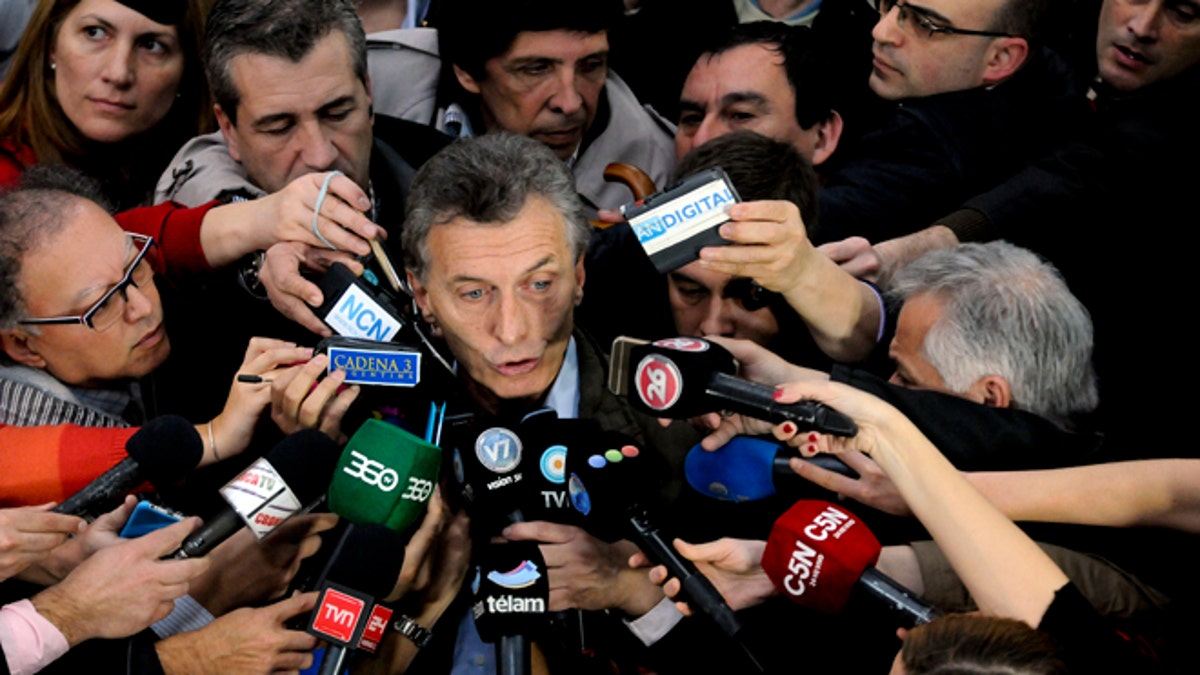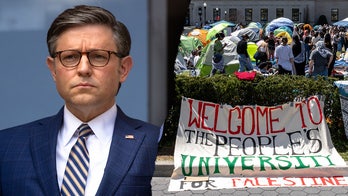
Outgoing mayor of Buenos Aires and presidential candidate Mauricio Macri, center, talks to the press after casting his vote in open primary elections in Buenos Aires, Argentina, Sunday, Aug. 9, 2015. The voters will decide Presidential candidates in their respective parties ahead of the Oct. 25, 2015 general elections. Macri is the top opposition candidate. (AP Photo/Maxi Failla)
BUENOS AIRES, Argentina (AP) – President Cristina Fernández de Kirchner's successor candidate, Daniel Scioli, was ahead on Monday in early results from open primaries for the next top leader of Argentina.
With more than 28 percent of ballots counted early Monday, Scioli was leading with nearly 37 percent of the vote. Mauricio Macri led opposition candidates with about 31 percent while Sergio Massa garnered less than 22 percent. Final results were expected later in the day.
Millions of voters in Argentina braved heavy rains to weigh in Sunday on what the South American nation should look like after the departure of Fernández, a polarizing leader who spent heavily on programs for the poor but failed to solve myriad economic problems.
The presidential candidates had all but sealed the nominations in their respective parties, making the exercise essentially a giant national poll ahead of the Oct. 25 elections. Several polling places were relocated during the day because of rains and flooding in some streets in greater Buenos Aires.
The nation known for its tango dancing and soccer players is struggling with economic problems, with independent analysts putting inflation at over 30 percent. A long-standing dispute with U.S. hedge funds that Fernández calls "vultures" has kept foreign investors away.
- Folk saints gain popularity in Pope Francis’ native Argentina
- Pope Francis honored through samba in Argentina
- Travel chaos in Argentina as transit unions strike
- Argentinians vote in primary elections that determine country’s political outlook after Cristina Fernandez
- Argentina confronts U.S. over Iran deal exonerating suspect wanted in 1994 bombing
Polls show voters deeply divided about how to best to tackle those issues.
"We need improvements in every area of life," Hector Ramírez, a 65-year-old doorman, said before polling stations closed. He said he was still undecided as he waited to vote at an elementary school.
"Argentina is a glorious country with abundant resources," said Ramírez. "The problem has always been who is governing."
The primaries are expected to help the top candidates judge how their campaigns are faring ahead of the general elections — in particular how closely to align their platforms to the social welfare policies of Fernández's political movement, known as Kirchnerismo.
Scioli, the governor of the Buenos Aires province and a former vice president, has praised Fernández's policies but also promised to make reforms where necessary and be more amicable in dealings with other countries.
Macri, the former mayor of Buenos Aires and ex-president of the popular Boca Junior soccer club, has promised to make the country more business friendly and immediately lift all restrictions on citizens' ability to buy U.S. dollars — a promise the government and some economists say isn't realistic.
Meanwhile Massa, who has cabinet and elective posts and before breaking with Fernández, is running on his own ticket and promises to jail corrupt politicians. His bid is a longshot, though he has enough support to be a spoiler or kingmaker in the general election.
Scioli has led the pack in the polls for several months, and was up by as many as 10 points over Macri in the most recent surveys.
Fernández is constitutionally barred from running for a third term. Fernández's late husband and predecessor, Nestor Kirchner, was elected in 2003 and served one term before she ran. The couple is widely credited with lifting Argentina after one of its worst moments, a $100 billion default in late 2001 that forced a run on the banks and wiped out the savings of many citizens.
But detractors say Fernández's policies, which include gas and transportation subsidies, along with perks for single mothers and periodic pension increases, have contributed to heavy inflation. There is also fatigue with her brash rhetoric aimed at political opponents and other countries.
Supporters say Fernández's strong personality commands respect internationally and that her social welfare spending is necessary to address vast inequalities at home.
Candidates on Sunday were also vying for several governor and congressional slots. Only those receiving at least 1.5 percent of the vote in their respective races will continue to the general elections, effectively eliminating many minority party candidates.
If Macri wins the primary or is close to Scioli, a runoff in November will be more likely. That would benefit Macri, who would likely pick up many opposition and independent votes.
Like us on Facebook




